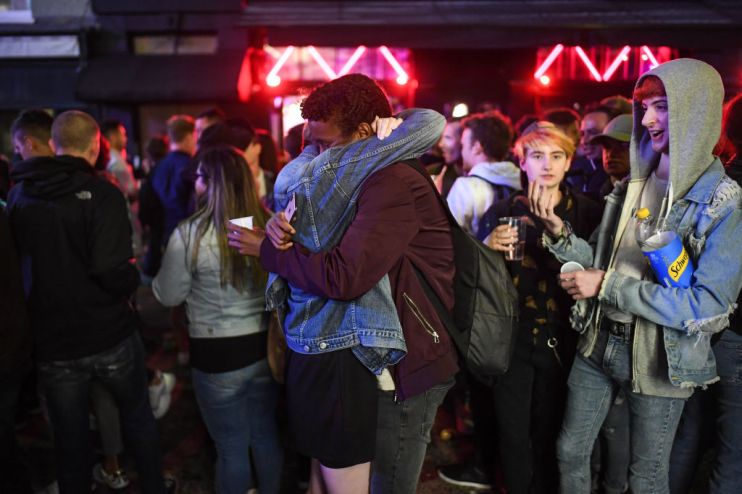Top London chefs expect summer gold-rush to toast end of Covid

The last 12 months have thoroughly rewired our attitudes to eating and drinking. Once second nature, now the thought of just popping out to a restaurant feels impossibly decadent. But chefs and restaurateurs, many of whom have borne the brunt of Covid restrictions, are now expecting a period of full houses and fat tips.
We asked some top London chefs to gaze into the crystal ball and tell us how they expect the next few months to look. And spoilers: it’s mostly good news.
Xavier Padovani, founder of Experimental Group
We don’t need to adapt and offer take away – people are so over it. No more take away! It’s time for people to come out. Our customers want and need to socialise, they want and need to come out for dinner, lunch and drinks. That’s what we are going to concentrate on, we are not a delicatessen or a take away place, we host people. That’s what we do.
Martin Williams, founder of M Restaurant
Strong brands underpinned with quality credentials will grow in popularity both locally and for destination dining as guests trade up to make the most of a dining experience. The High Street is likely to suffer the most.
Menus will likely remain digital, napkins paper, seating and tables more spaced. I think it will take time for standing events (drinks and canapes) to return to popularity.
Most restaurants will ‘drop’ the ‘finish at home boxes’ once re-opened. However, the culture will continue in the long term, along with delivery. The challenge is for our sector to pivot across all demands.
Richard Gladwin, co-founder of Gladwin Brothers
Restaurants that deliver well might have dark kitchens in locations they don’t have dine-in. There are some great [restaurants] out there that can offer both but I think [they will] have to lean to delivery as the main part of the business.
Andrey Datsenko, co-founder of TAKA Marylebone and MARU Mayfair
There will definitely be new openings coming soon. We are opening our own new restaurant MARU once restrictions are lifted. I believe there will be a boom in intimate and luxurious restaurants such as MARU, which will seat 10 people across the evening… With restrictions, customers also start looking for restaurants and amenities closer to their homes.
David Alves, executive chef at Robuchon International
After lockdown there will be a boom in the restaurant industry. This should happen for all restaurants as people will want to move around and enjoy life like it was before covid. They will want a restaurant with good food and entertainment – somewhere fun, easy going and warm. People will want to smile and laugh.
It’s logistically very difficult to serve top restaurant quality in house and also offer delivery. I am not sure if it will be a good direction in terms of quality but it’s the direction you must follow for the future. Delivery should definitely be a part of the future and should be factored into the restaurant’s budget.
Monika Linton, founder of Brindisa
I foresee the “good feel factor” lasting 12 months or more. Some have more disposable income and everyone has pent-up demand. The main thing is we are all hugely looking forward to bringing our teams back together and getting back to a sort of normality and carry on doing what we do best and what we love, looking after our customers and seeing their smiles.
Pablo Palomino, general manager at Al Mare restaurant at Carlton Tower Jumeirah
The last year has been a humbling experience for many restaurants in London. With the tourism industry shut down for most of the year, the success of restaurants has been in the hands of our locals, via restaurant or takeaway. We have learnt to genuinely put our guests’ needs first and accommodate as much as we can, way out of our comfort zone. Part of this experience will stay with us, as many boundaries have been broken for all the right reasons.
At the end of the day, it’s guests’ needs and demands who set the direction for the industry. If takeaway is what the business calls for, as we have seen, even high end restaurants are there to answer.
Large multi-site companies have it easier as they can use their less-busy locations to supply takeaway while their main locations continue to focus on the traditional restaurant business. Smaller businesses, on the other hand, will have to be creative in order to be able to satisfy their restaurant needs as well as their new demand for takeaway orders. “Ghost kitchens” are on the rise too, with facilities being built for takeaway food purposes in the outskirts of London as well as other large cities.
There will certainly be a huge demand for restaurants as soon as we open the doors. This has been a very long year, but it is now only a matter of months until the vaccination process is complete, so hopefully people will be responsible in the meantime and we will see the London hospitality industry in all its glory again before 2021 ends.
